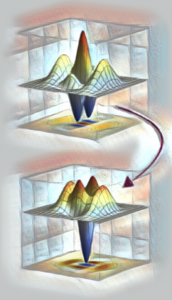 In the last decades, optimal transportation (OT) has emerged as a fertile field of inquiry, and an effective tool for the diverse exploration of applications within and beyond mathematics, including economics, meteorology, geometry, statistics, fluid mechanics, engineering, and design problems.
In the last decades, optimal transportation (OT) has emerged as a fertile field of inquiry, and an effective tool for the diverse exploration of applications within and beyond mathematics, including economics, meteorology, geometry, statistics, fluid mechanics, engineering, and design problems.
More recently, motivated by fundamental problems in Artificial Intelligence, Quantum Physics, and Electronic Structure Theory, the theory of OT has been broadening to a different class of state spaces such as the spaces of density matrices, operators, or more generally C* and von Neumann algebras, all of which are non-commutative. Although these non-commutative OT variants share a common mathematical feature, a unified geometrical perspective for them is still lacking. Additionally, many crucial analytical, computational, and statistical challenges remain unsolved, impeding the development of practical applications.
The program brings together and fosters collaborations among researchers from complementing mathematical communities that have been or are keen on working on the topic. More specifically, the program will focus on:
Eugene De Prince
(Florida State University)
Tryphon Georgiou
(University of California, Irvine (UCI))
Augusto Gerolin
(University of Ottawa)
Farnaz Heidar-Zadeh
(Queen's University)
Katarzyna Pernal
(Politechnika Lodzka)
Alessandro Rudi
(Ecole Normale Supérieure)
Dario Trevisan
(Università di Pisa)
Oliver Tse
(Eindhoven University of Technology)